2011 Schedule
May 28 |
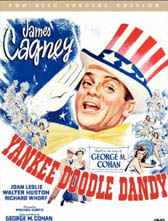 |
Yankee Doodle Dandy. GREAT FILM! And making it to the top 100 (for the 100 best movies ever made), this musical starring James Cagney as George M. Cohan is about the life of Cohan and the 4 Cohan's. George Cohan, wrote songs such as "The Yankee Doodle Boy", "Give My Regards to Broadway", "Overthere", "You're a Grand Old Flag", "Mary", "Off The Record", "H.A.R.R.I.G.A.N." etc....
In this movie playing his sister (Josie Cohan), is really his real sister (Jeanne Cagney). And on the set, Eddie Foy was played by a son of his (Eddie Foy Jr.). At the ending when James Cagney is walking down the stairs, then is tap dancing was not in the script. Originally Cagney was to just walk down, the rest he improvised. |
| June 11 |
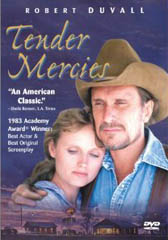 |
Tender Mercies. Sometimes everything comes together in a movie and it becomes something so much greater than the sum of its parts that it can only be described as a miracle. That's the case with Tender Mercies, a quietly luminous character piece about an alcoholic, washed-up country singer named Mac Sledge (Robert Duvall in an Oscar-winning performance) who hits bottom in a motel room one night and then slowly finds his way back into the land of the living with the help of the widow (Tess Harper) and her young son. It's a low-key, contemplative film that feels like a rural American family comedy in the vein of the great Japanese director, Yasujiro Ozu. Tender Mercies was directed by Australian Bruce Beresford (Driving Miss Daisy, Breaker Morant), written by Horton Foote (To Kill a Mockingbird), who won an Oscar for his screenplay, and has an unbeatable cast. This is one of Duvall's most intimate and deeply personal performances, matched only by his debut 14 years later as actor-writer-director in The Apostle. |
| June 25 |
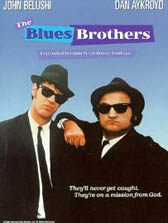 |
The Blues Brothers. After building up the duo's popularity through popular recordings and several performances on Saturday Night Live, John Belushi and Dan Aykroyd--as "legendary" Chicago blues brothers Jake and Elwood Blues--took their act to the big screen in this action-packed hit from 1980. As Jake and Elwood struggle to reunite their old band and save the Chicago orphanage where they were raised, they wreak enough good-natured havoc to attract the entire Cook County police force. The result is a big-budget stunt-fest on a scale rarely attempted before or since, including extended car chases that result in the wanton destruction of shopping malls and more police cars than you can count. Along the way there's plenty of music to punctuate the action, including performances by Ray Charles, Aretha Franklin, Cab Calloway, and James Brown that are guaranteed to knock you out. As played with deadpan wit by Belushi and Aykroyd, the Blues Brothers are "on a mission from God," and that gives them a kind of reckless glee that keeps the movie from losing its comedic appeal. Otherwise this might have been just a bloated marathon of mayhem that quickly wears out its welcome (which is how some critics described this film and its 1998 sequel). Keep an eye out for Steven Spielberg as the city clerk who stamps some crucial paperwork near the end of the film. |
| July 9 |
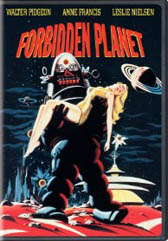 |
Forbidden Planet. This 1956 pop adaptation of Shakespeare's The Tempest is one of the best, most influential science fiction movies ever made. Its space explorers are the models for the crew of Star Trek's Enterprise, and the film's robot is clearly the prototype for Robby in Lost in Space. Walter Pidgeon is the Prospero figure, presiding over a paradisiacal world with his lovely young daughter and their servile droid. When the crew of a spaceship lands on the planet, they become aware of a sinister invisible force that threatens to destroy them. Great special effects and a bizarre electronic score help make this movie as fresh, imaginative, and fun as it was when first released. |
| July 30 |
 |
Airplane! The quintessential movie spoof that spawned an entire genre of parody films, the original Airplane! still holds up as one of the brightest comedic gems of the '80s, not to mention of cinema itself (it ranked in the top 5 of Entertainment Weekly's list of the 100 funniest movies ever made). The humor may be low and obvious at times, but the jokes keep coming at a rapid-fire clip and its targets--primarily the lesser lights of '70s cinema, from disco films to star-studded disaster epics--are more than worthy for send-up. If you've seen even one of the overblown Airport movies then you know the plot: the crew of a filled-to-capacity jetliner is wiped out and it's up to a plucky stewardess and a shell-shocked fighter pilot to land the plane. Robert Hays and Julie Hagerty are the heroes who have a history that includes a meet-cute à la Saturday Night Fever, a surf scene right out of From Here to Eternity, a Peace Corps trip to Africa to teach the natives the benefits of Tupperware and basketball, a war-ravaged recovery room with a G.I. who thinks he's Ethel Merman (a hilarious cameo)--and those are just the flashbacks! The jokes gleefully skirt the boundaries of bad taste (pilot Peter Graves to a juvenile cockpit visitor: "Joey, have you ever seen a grown man naked?"), with the high (low?) point being Hagerty's intimate involvement with the blow-up automatic pilot doll, but they'll have you rolling on the floor. The film launched the careers of collaborators Jim Abrahams (Big Business), David Zucker (Ruthless People), and Jerry Zucker (Ghost), as well as revitalized such B-movie actors as Lloyd Bridges, Peter Graves, Robert Stack, and Leslie Nielsen, who built a second career on films like this. A vital part of any video collection. |
| August 13 |
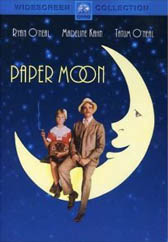 |
Paper Moon.A sweet and subtle gem of a movie. Newly orphaned Addie (Tatum O'Neal) falls into the care of small-time con artist Moses Pray (Ryan O'Neal, Tatum's real-life father) and turns out to be better at grifting than he is. Set in Depression-era Kansas, Paper Moon is a miracle of unity. The set design and cinematography combine to give both the flavor of documentary photos and the visual quality of movies from the period, and every performance meshes with the overall tone of sincerity, earnest optimism, and creeping desperation. The rapport between Addie and Moses is phenomenal--and being father and daughter doesn't make that a sure thing. Ryan O'Neal gives a truly great performance (perhaps the only one of his career) and Tatum won an Oscar for Best Supporting Actress (she's the youngest winner in history). Madeline Kahn was also nominated for her wonderfully funny and sad turn as an exotic dancer named Trixie Delight. Paper Moon has a miraculous combination of outrageous sentimentality and pragmatic cynicism; the result is genuinely touching. One of director Peter Bogdanovich's best films, and kind of a comic companion piece to The Last Picture Show.
|
| Sept. 3 |
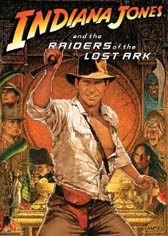 |
Raiders of the Lost Ark. It’s said that the original is the greatest, and there can be no more vivid proof than Raiders of the Lost Ark, the first and indisputably best of the initial three Indiana Jones adventures cooked up by the dream team of Steven Spielberg and George Lucas. Expectations were high for this 1981 collaboration between the two men, who essentially invented the box office blockbuster with ‘70s efforts like Jaws and Star Wars, and Spielberg (who directed) and Lucas (who co-wrote the story and executive produced) didn’t disappoint. This wildly entertaining film has it all: non-stop action, exotic locations, grand spectacle, a hero for the ages, despicable villains, a beautiful love interest, humor, horror… not to mention lots of snakes. And along with all the bits that are so familiar by now--Indy (Harrison Ford) running from the giant boulder in a cave, using his pistol instead of his trusty whip to take out a scimitar-wielding bad guy, facing off with a hissing cobra, and on and on--there’s real resonance in a potent storyline that brings together a profound religious-archaeological icon (the Ark of the Covenant, nothing less than "a radio for speaking to God") and the 20th century’s most infamous criminals (the Nazis). Now that’s entertainment. |
| Sept. 17 |
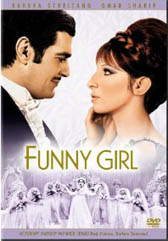 |
Funny Girl. Ah, Barbra. Of all her onscreen personas, she sparkles in none as she does in her role as 1930s comedian Fanny Brice in the musical Funny Girl. Portraying the life of this star of stage and radio, Brice preens and prances and sings, captivating her audience both onscreen and off. Fanny Brice started life on the Lower East Side of New York, the daughter of a Jewish saloon owner. Not the prettiest girl around, Brice still managed to quickly rise to stardom as a performer in the Ziegfield Follies. A shrewd, obstinate woman, Brice dictated her own success story on stage; things were a different matter in romance. Falling hard for the stunning Nick Arnstein (suavely played by Omar Sharif), Brice must navigate a difficult marriage. While kids may love the tunes (which include the now-infamous "People," as in "People who need people are the luckiest people in the world"), the plot is definitely adult-oriented. Enjoy this one, but don't go too far out of your way for the sequel, Funny Lady. |
| Oct. 1 |
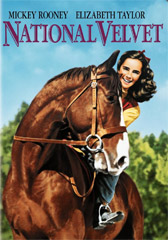 |
National Velvet. This 1944 family film made a star of 12-year-old Elizabeth Taylor in the title role as spunky Velvet Brown, a girl who's determined to enter her horse, Pie, in the Grand National Steeplechase. Critic Pauline Kael called it "One of the most likeable movies of all time." Mickey Rooney costars as a young man who helps Velvet train Pie for the big race. At the last minute, Velvet herself has to ride Pie in the tournament and cuts her hair to pass for a jockey. Anne Revere won an Oscar as Velvet's mother, as did editor Robert J. Kern, who cut together a terrifically exciting horse race. Donald Crisp and Angela Lansbury are also featured as members of the Brown family. |
HOME | DIRECTIONS
SCHEDULES FOR PREVIOUS YEARS
|

